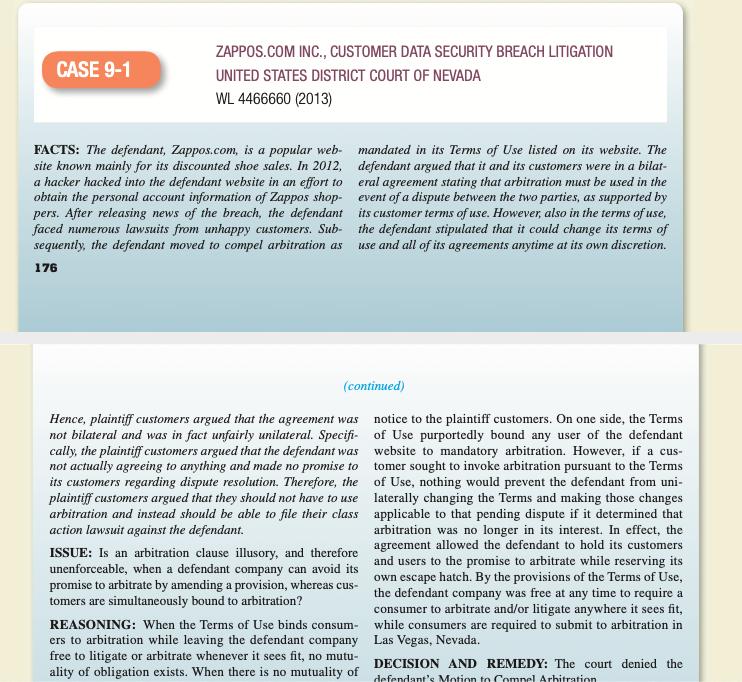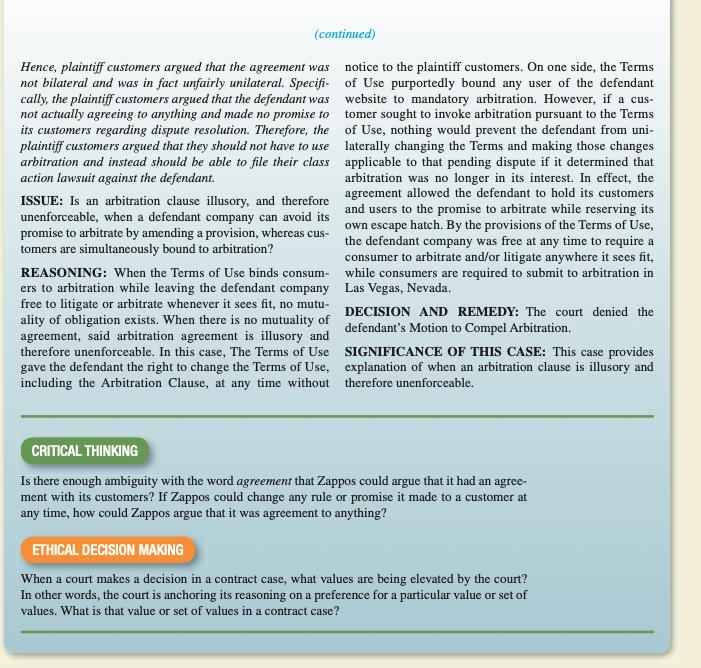Answered step by step
Verified Expert Solution
Question
1 Approved Answer
CASE 9-1 ZAPPOS.COM INC., CUSTOMER DATA SECURITY BREACH LITIGATION UNITED STATES DISTRICT COURT OF NEVADA WL 4466660 (2013) FACTS: The defendant, Zappos.com, is a


CASE 9-1 ZAPPOS.COM INC., CUSTOMER DATA SECURITY BREACH LITIGATION UNITED STATES DISTRICT COURT OF NEVADA WL 4466660 (2013) FACTS: The defendant, Zappos.com, is a popular web site known mainly for its discounted shoe sales. In 2012, a hacker hacked into the defendant website in an effort to obtain the personal account information of Zappos shop- pers. After releasing news of the breach, the defendant faced numerous lawsuits from unhappy customers. Sub- sequently, the defendant moved to compel arbitration as 176 mandated in its Terms of Use listed on its website. The defendant argued that it and its customers were in a bilat- eral agreement stating that arbitration must be used in the event of a dispute between the two parties, as supported by its customer terms of use. However, also in the terms of use, the defendant stipulated that it could change its terms of use and all of its agreements anytime at its own discretion. (continued) Hence, plaintiff customers argued that the agreement was not bilateral and was in fact unfairly unilateral. Specifi- cally, the plaintiff customers argued that the defendant was not actually agreeing to anything and made no promise to its customers regarding dispute resolution. Therefore, the plaintiff customers argued that they should not have to use arbitration and instead should be able to file their class action lawsuit against the defendant. ISSUE: Is an arbitration clause illusory, and therefore unenforceable, when a defendant company can avoid its promise to arbitrate by amending a provision, whereas cus- tomers are simultaneously bound to arbitration? REASONING: When the Terms of Use binds consum- ers to arbitration while leaving the defendant company free to litigate or arbitrate whenever it sees fit, no mutu- ality of obligation exists. When there is no mutuality of notice to the plaintiff customers. On one side, the Terms of Use purportedly bound any user of the defendant website to mandatory arbitration. However, if a cus- tomer sought to invoke arbitration pursuant to the Terms of Use, nothing would prevent the defendant from uni- laterally changing the Terms and making those changes applicable to that pending dispute if it determined that arbitration was no longer in its interest. In effect, the agreement allowed the defendant to hold its customers and users to the promise to arbitrate while reserving its the defendant company was free at any time to require a own escape hatch. By the provisions of the Terms of Use, consumer to arbitrate and/or litigate anywhere it sees fit, while consumers are required to submit to arbitration in Las Vegas, Nevada. DECISION AND REMEDY: The court denied the defendant's Motion to Compel Arbitration (continued) Hence, plaintiff customers argued that the agreement was not bilateral and was in fact unfairly unilateral. Specifi- cally, the plaintiff customers argued that the defendant was not actually agreeing to anything and made no promise to its customers regarding dispute resolution. Therefore, the plaintiff customers argued that they should not have to use arbitration and instead should be able to file their class action lawsuit against the defendant. ISSUE: Is an arbitration clause illusory, and therefore unenforceable, when a defendant company can avoid its promise to arbitrate by amending a provision, whereas cus- tomers are simultaneously bound to arbitration? REASONING: When the Terms of Use binds consum- ers to arbitration while leaving the defendant company free to litigate or arbitrate whenever it sees fit, no mutu- ality of obligation exists. When there is no mutuality of agreement, said arbitration agreement is illusory and therefore unenforceable. In this case, The Terms of Use gave the defendant the right to change the Terms of Use, including the Arbitration Clause, at any time without notice to the plaintiff customers. On one side, the Terms of Use purportedly bound any user of the defendant website to mandatory arbitration. However, if a cus- tomer sought to invoke arbitration pursuant to the Terms of Use, nothing would prevent the defendant from uni- laterally changing the Terms and making those changes applicable to that pending dispute if it determined that arbitration was no longer in its interest. In effect, the agreement allowed the defendant to hold its customers and users to the promise to arbitrate while reserving its own escape hatch. By the provisions of the Terms of Use, the defendant company was free at any time to require a consumer to arbitrate and/or litigate anywhere it sees fit, while consumers are required to submit to arbitration in Las Vegas, Nevada. DECISION AND REMEDY: The court denied the defendant's Motion to Compel Arbitration. SIGNIFICANCE OF THIS CASE: This case provides explanation of when an arbitration clause is illusory and therefore unenforceable. CRITICAL THINKING Is there enough ambiguity with the word agreement that Zappos could argue that it had an agree- ment with its customers? If Zappos could change any rule or promise it made to a customer at any time, how could Zappos argue that it was agreement to anything? ETHICAL DECISION MAKING When a court makes a decision in a contract case, what values are being elevated by the court? In other words, the court is anchoring its reasoning on a preference for a particular value or set of values. What is that value or set of values in a contract case?
Step by Step Solution
There are 3 Steps involved in it
Step: 1

Get Instant Access to Expert-Tailored Solutions
See step-by-step solutions with expert insights and AI powered tools for academic success
Step: 2

Step: 3

Ace Your Homework with AI
Get the answers you need in no time with our AI-driven, step-by-step assistance
Get Started


